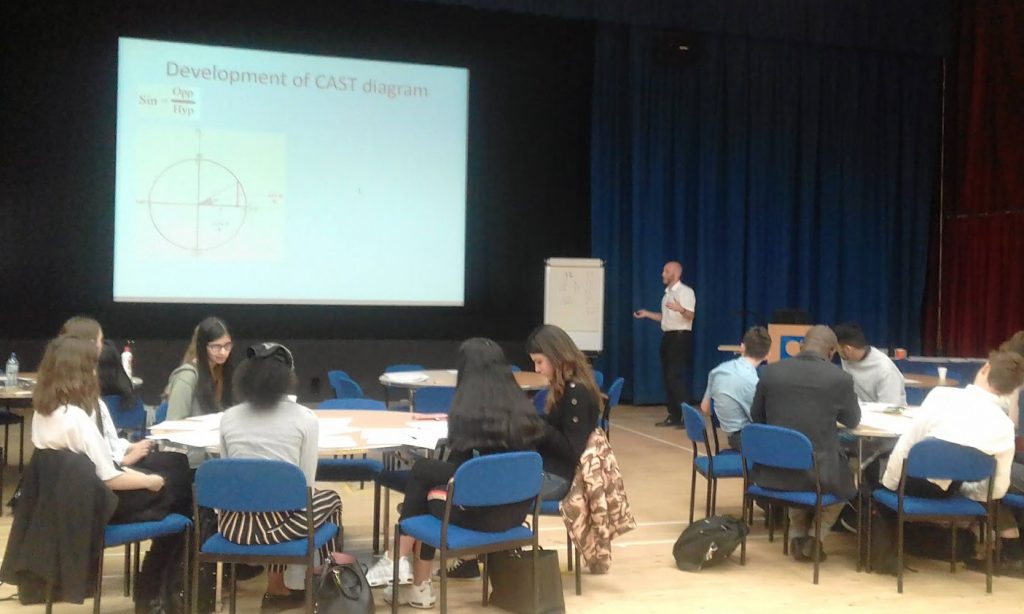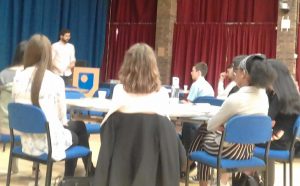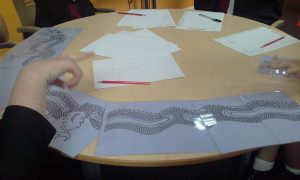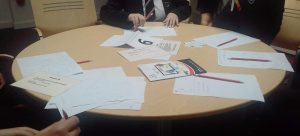Rebecca Would is a sixth-form work experience student who visited the Maths and Stats department of the OU and supported the School Maths Conference. This is her report.
In July the OU ran a maths conference in conjunction with some local secondary maths teachers. The first day gave the 25 or so year 11s that turned up a brief introduction to some of what is covered in the year 12 A-level maths syllabus. This would have been a really beneficial experience for the year 11s, as it means the content will be less new in the first term and easier to understand.

We started off with surds and indices, the basis of all good algebra and geometry, and moved through quadratics, trigonometry and vectors giving the students the grounding in the core maths that’s needed throughout the A-level. The students got on really well, both with the work and together across different schools with new people.
The students were shown examples and then set tasks in a work book, while me and the other teachers went around offering advice and hints to the students when required and talking to them about their A-level options. I was able to share my experience at A-level with the students, which I hope was helpful, and also some of the things I’ve learnt from my A-level. Advice such as completing the exercises or keep your graphical calculator on you sounds like a teacher is being fussy but coming from another student presently doing their A-levels can actually be more compulsive. I was also interested to hear their thoughts on GCSEs, especially with the new content and grades that came in last year, although they haven’t received results back yet so this conversation went only so far.
I was also encouraged to offer more general A-level advice, and the students I spoke to seemed to appreciate these extra tips – I certainly would have done had I known them before entering year 12. These included:
- blocking out time at the start of the year for subjects so you know if you spend an hour chatting with friends, which is a perfectly reasonable thing to do, what subject you possibly should have been spending that time on this also helps to prevent a last minute rush for doing homework;
- not to start worrying if something you grasped at GCSE level throws a curveball at you and you can’t get your head around a particular topic;
- spend some of that time with friends, it is unreasonable to expect yourself to work at 100% every day,
- if you have a rough day do take some time to chat with friends or read a book to get your head back in the right mental space for doing work.

A guest speaker, Marc Pradas, joined us from the OU to speak about his research and chaos theory. I for one, found this fascinating as he went into some detail about the butterfly effect and why that works, as well as giving the background to ‘non-linear directive dynamic systems’ which is a lot more fun than it sounds!
For the second day I was primarily based with the year 10s. This was for three schools and the session run by Kristen Coldwell from AMSP (advanced mathematics support programme). She started off with some logical thinking starter puzzles while everyone arrived. She then spoke for a bit about the benefits of maths as an A-level, and the different careers in which it can be used, as well as some of the courses it is needed for to get on at university.

After this Kristen ran a dragon race activity which required the students in teams to build a dragon by answering maths puzzles. This was a great team building exercise and the students did really well in answering the range of maths problems presented to them.
Post lunch the year 10s and 11s combined for a code breaking exercise run by Charlotte from the OU. This was good as we mixed the teams up between years 10 and 11 and the had a chance to discuss why they’d chosen maths or why they might choose maths, as well as had the opportunity to work together, which all students took really well and used the opportunity.

Overall the two days were really good and we hope that the students and teachers there too agree in the benefit for their students.
By Work experience student Rebecca Would
